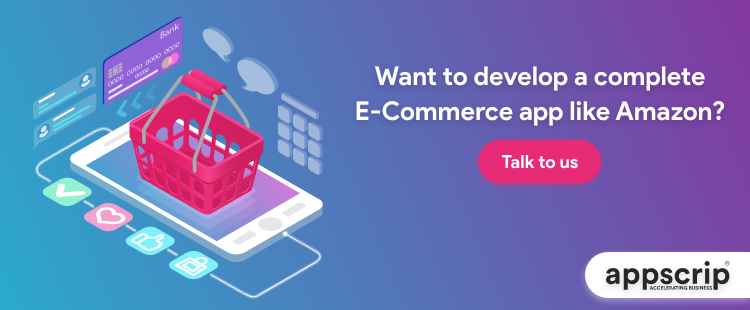San Francisco is often hailed as the tech capital of the world. It homes a plethora of innovative startups and tech giants. Among the various sectors that thrive in this bustling city, e-commerce has emerged as a major player.
E-commerce apps have a high adoption rate among the hoi-polloi for various reasons: Firstly, users can shop 24/7. Secondly, there’s a wide range of products and services in comparison to traditional brick-and-mortar stores. Thirdly, the prices are competitive, there’s loyalty points and huge discounts. Lastly, they provide a convenient and efficient shopping experience.
In this blog, we’ll explore the top e-commerce apps in San Francisco that have gained acceptance among the residents of the Silicon Valley. For each app we provide you a brief overview that include founder names, total funding till date, their business model, unique selling propositions, and revenue insights.
7 Top E-commerce Apps In San Francisco
E-commerce mobile apps allow users to buy and sell products and services. E-commerce apps have become increasingly popular, as more and more people utilise smartphones, PCs and tablets to shop online. Here are the top e-commerce apps in San Francisco.
Instacart
Founders: Apoorva Mehta, Brandon Leonardo, and Max Mullen
Total Funding: Over $2.2 billion
Business Model: Hyper-local on-demand grocery delivery platform that connects customers with personal shoppers.
Unique Selling Proposition: Same-day grocery delivery from popular stores.
Brief on the App: Instacart has revolutionised the way people shop for groceries by offering a convenient and efficient delivery service. They partner with major grocery chains, allowing customers to order online and have their groceries delivered to their doorstep. Hence we have Instacart among the top e-commerce apps in San Francisco.
Instacart generates revenue through delivery fees, subscription models, and partnerships with retailers. As of 2021, the company reported a revenue of $1.5 billion.
DoorDash
Founders: Tony Xu, Andy Fang, and Stanley Tang
Total Funding: Over $2.5 billion
Business Model: Food delivery and logistics platform
Unique Selling Proposition: Extensive restaurant partnerships and fast delivery.
Brief on the App: DoorDash is an on-demand logistics firm, that’s an intermediary between merchants and buyers who wish to get products from local merchants delivered at their doorstep. DoorDash is quite popular for its food delivery service that connects users with their favourite local restaurants. They command a 58% market share in the US.
The company operates on a commission-based revenue model, taking a percentage cut on each order placed through its platform.
DoorDash reported $2.9 billion in revenue in 2020, reflecting the growing demand for food delivery services, especially during the pandemic. DoorDash earned $6.58 billion in 2022, which is a 34% increase over previous year.
Shopify
Founders: Tobias Lütke, Daniel Weinand, and Scott Lake
Total Funding: Not Applicable (Publicly traded)
Business Model: Ecommerce platform for businesses
Unique Selling Proposition: User-friendly platform for creating online stores.
Brief on the App: Shopify is a globally recognised e-commerce platform that empowers businesses to set up and manage their online stores. The company derives its revenue from monthly subscription fees, transaction fees, and add-on services. E-commerce stores have a success rate of 5% to 10% on Shopify.
The company has dissected unsuccessful operations by some entities that is basically due to lack of purpose, ineffective marketing, lack of mobile optimisation, poor user experience, poor product image quality, not enough cross-sell, upsell, not enough testimonials, and social proof.
Folks looking to set shop on Shopify know what to look out for now. In 2020, Shopify reported $2.9 billion in revenue, underlining its significance in the e-commerce industry.
ThredUp
Founders: James Reinhart, Oliver Lubin, and Chris Homer
Total Funding: Over $300 million
Business Model: Online thrift store and resale marketplace
Unique Selling Proposition: Sustainable fashion and second-hand clothing.
Brief on the App: ThredUp is among the top e-commerce apps in San Francisco and a pioneer in the online thrift store space, offering a wide range of second-hand clothing and accessories. They are one of the world’s largest online resale platforms dealing with women’s and kids’ apparel, shoes, and accessories. The company monetises through commissions on sales and processing fees.
Several leading brands and retailers are taking advantage of Thredup’s Resale-as-a-Service (“RaaS”) offering. ThredUp generated $251.8 Million in revenue in 2021. This year ThredUP expects to earn around $326.5 million and gross margin in the range of 66.5%.
Wish
Founders: Peter Szulczewski and Danny Zhang
Total Funding: Over $1 billion
Business Model: Mobile shopping app connecting users to global sellers.
Unique Selling Proposition: Low-cost, discounted products.
Brief on the App: In 2018 Wish was the world’s most-downloaded e-commerce app with 161 million installs globally. Wish connects users with a vast array of products from global sellers at highly discounted prices. They generate revenue charging 15% transaction fees on each sale, product listings, and advertising.
In 2022 Wish earned $1.9 billion, which is double to what it earned the previous year. During their launch they raised $1.3 billion and during the last funding round it was valued at more than $8.7 billion.
In 2020, Wish reported revenues of $2.54 billion, showcasing its appeal to budget-conscious shoppers.
Poshmark
Founders: Manish Chandra, Tracy Sun, Gautam Golwala, and Chetan Pungaliya
Total Funding: Over $160 million
Business Model: Social commerce platform for resale fashion.
Unique Selling Proposition: Community-driven marketplace for fashion enthusiasts.
Brief on the App: Poshmark is among the top e-commerce apps in San Francisco and a social commerce platform that allows users to buy and sell fashion online. Sellers have various options to monetise their listings including, content, inventory selection, and social interactions. The app takes a commission on each sale, and its revenue is highly dependent on the volume of transactions.
Poshmark does the shipping while taking a cut of 20% for sales over $15 and a flat rate of $2.95 for deals under $15. In 2020, the company reported annual revenue of $193.8 million.
Chewy
Founders: Ryan Cohen and Michael Day
Total Funding: Not Applicable (Publicly traded)
Business Model: Online retailer for pet products
Unique Selling Proposition: Extensive selection of pet-related products.
Brief on the App: Chewy is an e-commerce company that primarily deals in pet products, from food to toys and medication both online and at 27 retail locations around the U.S. Pet owners have a choice of over 2,000 brands and categories that include food, vitamins & supplements, toys, beds, and many more.
The company’s revenue primarily comes from product sales, reflecting the pet industry’s continued growth, thus placing them among the top e-commerce apps in San Francisco.
In March 2021, Chewy earned $2.04 billion for Q4 of 2020, this was Chewy’s first quarter of net profitability. In 2020 the net sales amounted to $7.15 billion. For the 2021 fiscal year Chewy reported net sales of $8.89 billion.
E-commerce Domains Are Money Spinners
There are multiple ways for entrepreneurs and businesses in the e-commerce domain to earn huge amounts of revenue. Here are a few:
- Selling high-margin products: One way to earn plenty of revenue from an e-commerce app is to sell high-margin products. This means selling products that have a high profit margin, such as luxury goods or electronics.
- Upselling and cross-selling: Upselling is the practice of selling more expensive products to customers who are already interested in buying something. Cross-selling is the practice of selling additional products to customers who have decided to buy something. Both strategies can help businesses increase their revenue.
- Offering discounts and promotions: Offering discounts and promotions is another way to increase sales and revenue. This can be done by offering coupons, free shipping, or other incentives to customers.
- Building a loyal customer base: Building a loyal customer base is essential for any business that wants to earn a lot of revenue. This can be done by providing excellent customer service, offering rewards programs, and keeping customers updated on new products and promotions.
Conclusion: Top E-commerce Apps In San Francisco
San Francisco’s vibrant tech ecosystem has given rise to these innovative ecommerce apps, each offering a unique value proposition and contributing to the city’s reputation as a hub of technological innovation.
From groceries to fashion and even pet supplies, these apps cater to a diverse range of consumer needs, making life more convenient and enjoyable for residents and users worldwide.
We are an app development company that specialises in building e-commerce apps for entrepreneurs and businesses. We have a team of experienced developers who can help you create a custom app that meets your specific needs and requirements.
We build e-commerce apps on the latest technologies that are designed to be scalable and secure. We understand that every business is different, so we offer a flexible and customisable development process.

After an Engineering degree and a Diploma in Management I devoted 16+ years working in the automotive industry. My innate skill and extreme passion in writing, encouraged me to adopt it up as a profession. I have been writing for more than 10+ years in the software industry. The 400+ blogs I published are informative, exhaustive and interesting to a professional and causal reader.









